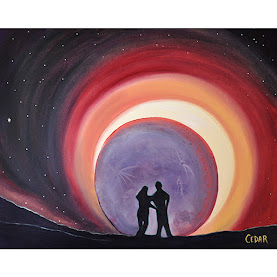All you have to know about the Eclipse Season
An eclipse season is a 35 - days period during which at least two (or even three) eclipses occur. In fact, every year we have from 4 to 7 eclipses within two seasons of eclipses. They repeat themselves in cycles of 173.3 days (more or less six months) and in some years we can also have a third eclipse season between two years, so it’s possible to reach the number of seven eclipses in two years.
 |
| Eclipse Love. 24″ x 30″, Oil on Canvas, © 2016 Cedar Lee |
Lunar nodes and the ecliptic:
The ecliptic is the
plane of the Earth's orbit around the Sun. A lunar node is the point where, in
the Earth's monthly orbit, the lunar orbit intersects that plane. We have an
eclipse season when - from Earth's point of view - the Sun is close enough to a
lunar node for an eclipse to occur. If the Sun is close to a lunar node
during a Full Moon, we see a lunar eclipse. If the Sun is close to a lunar node
at the New Moon, a solar eclipse occurs.
To put it another way,
if the Moon becomes New or Full near one of its nodes, then an eclipse becomes
inevitable, because the lunar and solar orbits coincide.
Since the lunar month
(the time period between successive new moons or successive complete moons)
lasts approximately 29.5 days, a minimum of two eclipses (one solar and one
lunar) occur in one eclipse season. A maximum of three eclipses (lunar / solar
/ lunar or solar / lunar / solar) are possible, although the first eclipse of
the eclipse season must occur early enough to allow for a third eclipse towards
the end.
If we have seven
eclipses in a solar year it is because the first belongs to an eclipse season
that started in the previous year and / or the seventh eclipse belongs to an
eclipse season that will end in the following year. However, it is rare for seven
eclipses to occur in a calendar year. It happened for the last time in the year
1982 and it will happen again in the year 2038.
Why do eclipse
seasons occur?
There
are many cycles in the firmament, and the eclipse season is just one of them.
We have to consider that if the Moon orbited the Earth on the same plane on
which the Earth orbits the Sun, then we would have a solar eclipse at each new
moon and a lunar eclipse for each full moon. But since the orbit of the Moon is
inclined by 5 degrees from the ecliptic (Earth's orbital plane), most of the
time the New Moon or the Full Moon oscillate too far north or south from the
ecliptic for an eclipse to occur.
Why do we need to know what an eclipse is?
It's simple: because eclipses align us with our life purpose. Unlike
other phenomena, from the astrological point of view, eclipses generate changes
regardless of our will or the work of growth we are doing. It is said that with
eclipses we live what we have to live to evolve, to get closer to the reason
why we returned to this planet in this incarnation.
The perceived effect is totally personal, but one thing is certain: the
more we are resisting change, the more impactful and difficult to manage the
energy will be. The lunar eclipse in particular is the timer or the lens
through which we perceive external cosmic phenomena. Unlike the solar ones,
which are more obvious and evident, the lunar ones work on a subconscious
level, they are a subtle expression of solar eclipses. They lead to closure, to
a profound realization that tells us what it is time to let go.
What is the astrological meaning of a solar
eclipse?
Astrologically, a solar eclipse has the same effect as
an enhanced New Moon. We therefore find here the notion of rebirth and new
beginning. Everything we sow on that day will be important and will have a
big impact on the future (up to 6 months). So, if you sow something
positive, you can hope that it will grow in the following days and months ...
On the contrary, if during that day, for example we argue with our partner,
there are chances that the story is starting to crack ... Obviously, in order
to have more precise forecasts, it is necessary to analyze the position of all
the planets at the time of the eclipse.
What is the astrological meaning of a
lunar eclipse?
Astrologically, a lunar eclipse acts like an enhanced
Full Moon. It coincides with a moment of extreme lucidity, we realize that
what we have sown begins to bear its fruits. On the contrary, it could
represent an opportunity to make a change in one's life, both professionally
and emotionally.
⭐ Follow me on instagram: @ebla.astrology ⭐
Comments
Post a Comment